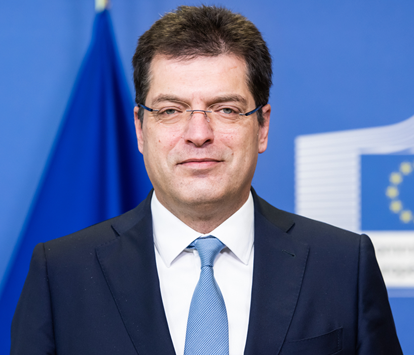Article contents
Interview with Janez Lenarčič
European Commissioner for Crisis Management
Published online by Cambridge University Press: 06 September 2021
Abstract

Janez Lenarčič is currently serving as Commissioner for Crisis Management in the European Commission, a mandate he took up in December 2019. In this capacity, he is responsible for EU civil protection as well as humanitarian aid. Mr Lenarčič served as Ambassador and Permanent Representative of Slovenia to the European Union (EU) in Brussels from 2016 to 2019. From 2014 to 2016, he held the Secretary of State position in the cabinet of the Slovenian Prime Minister. His previous experience also includes the position of Director of the Organization for Security and Cooperation in Europe's (OSCE) Office for Democratic Institutions and Human Rights, in Warsaw, from 2008 to 2014. He has also served as Secretary of State for European Affairs, including representing Slovenia during the Lisbon Treaty negotiations in 2007 and later representing the Slovenian EU Council Presidency to the European Parliament in 2008. In 2002 and 2003 he held the position of State Secretary in the cabinet of the Slovenian Prime Minister, after which he served as Slovenian Ambassador to the OSCE. In 2005, he was also Chairman of the Permanent Council of the OSCE in Vienna. In 2000 he served as Adviser to the Minister for Foreign Affairs, and the following year he became the Diplomatic Adviser to the then Slovenian Prime Minister. Between 1994 and 1999 he was posted to Slovenia's Permanent Representation to the United Nations (UN) in New York, where he also served as the alternate representative of Slovenia on the UN Security Council. Mr Lenarčič holds a degree in international law from Ljubljana University.
- Type
- Interview
- Information
- International Review of the Red Cross , Volume 103 , Issue 916-917: Counterterrorism, sanctions and war , April 2021 , pp. 73 - 84
- Copyright
- Copyright © The Author(s), 2021. Published by Cambridge University Press on behalf of the ICRC
Footnotes
This interview was conducted by Dr Knut Dörmann, Head of Delegation to the European Union, the North Atlantic Treaty Organization and the Kingdom of Belgium, ICRC.
References
1 Consolidated Version of the Treaty on the Functioning of the European Union, OJ L. 326/47-326/390. 26 October 2012, Art. 196.
2 Ibid., Art. 214.
3 See “Janez Lenarčič's Answers to the European Parliament Questionnaire”, p. 7, available at: https://ec.europa.eu/commission/commissioners/2019-2024/lenarcic_en (all internet references were accessed in July 2021).
4 The humanitarian principles are defined, inter alia, in the European Consensus on Humanitarian Aid, OJ 2008/C25/1, 30 January 2008, Part 2.
5 EU, Updated European Union Guidelines on Promoting Compliance with International Humanitarian Law, OJ 2009/C303/06, 15 December 2009 (EU IHL Guidelines).
6 European Commission, Communication from the Commission to the European Parliament and the Council on the EU's Humanitarian Action: New Challenges, Same Principles, COM (2021) 110 final, Brussels, 10 March 2021 (Communication on the EU's Humanitarian Action).
7 Directive (EU) 2017/541 of the European Parliament and of the Council on Combating Terrorism and Replacing Council Framework Decision 2002/475/JHA and Amending Council Decision 2005/671/JHA, 15 March 2017, Recital 37.
8 See European Commission, “Commission Publishes Guidance on Coronavirus-Related Humanitarian Aid to Syria Despite Sanctions”, press release, Brussels, 12 May 2020, available at: https://ec.europa.eu/commission/presscorner/detail/en/IP_20_831.
9 The European Commission released and then expanded its guidance note on how COVID-19-related humanitarian aid can be provided to countries and areas around the world that are subject to EU restrictive measures (sanctions), namely Syria (published in May 2020), Iran and Venezuela (published in October 2020) and Nicaragua (published in November 2020). See European Commission, Guidance Note on the Provision of Humanitarian Aid to Fight the Covid-19 Pandemic in Certain Environments Subject to EU Restrictive Measures, C (2020) 3179, Brussels, 11 May 2020, 9 October 2020, 16 November 2020 (EU Guidance Note).
10 Ibid.
11 Available at: https://dgecho-partners-helpdesk.eu/sanctions/eu-restrictive-measures.
12 See Directive (EU) 2017/541, above note 7.
13 EU Guidance Note, 11 May 2020, above note 9, Question 24.
14 Council of the European Union, Council Decision (CFSP) 2020/1999 concerning Restrictive Measures against Serious Human Rights Violations and Abuses, 7 December 2020.
15 See online introduction to the International Review of the Red Cross issue on “Protracted Conflict”, Vol. 101, No. 912, 2020, available at: https://international-review.icrc.org/reviews/irrc-no-912-protracted-conflict.
16 Council of the European Union, “Operationalising the Humanitarian-Development Nexus”, Council Conclusions, Ref. No. 9383/17, 19 May 2017.
17 The six pilot countries are Chad, Iraq, Myanmar, Nigeria, Uganda and Sudan.
18 Communication on the EU's Humanitarian Action, above note 6.
19 European Commission, “European Union Humanitarian Air Bridge”, available at: https://ec.europa.eu/echo/what/humanitarian-aid/humanitarian-air-bridge_en.
- 1
- Cited by


